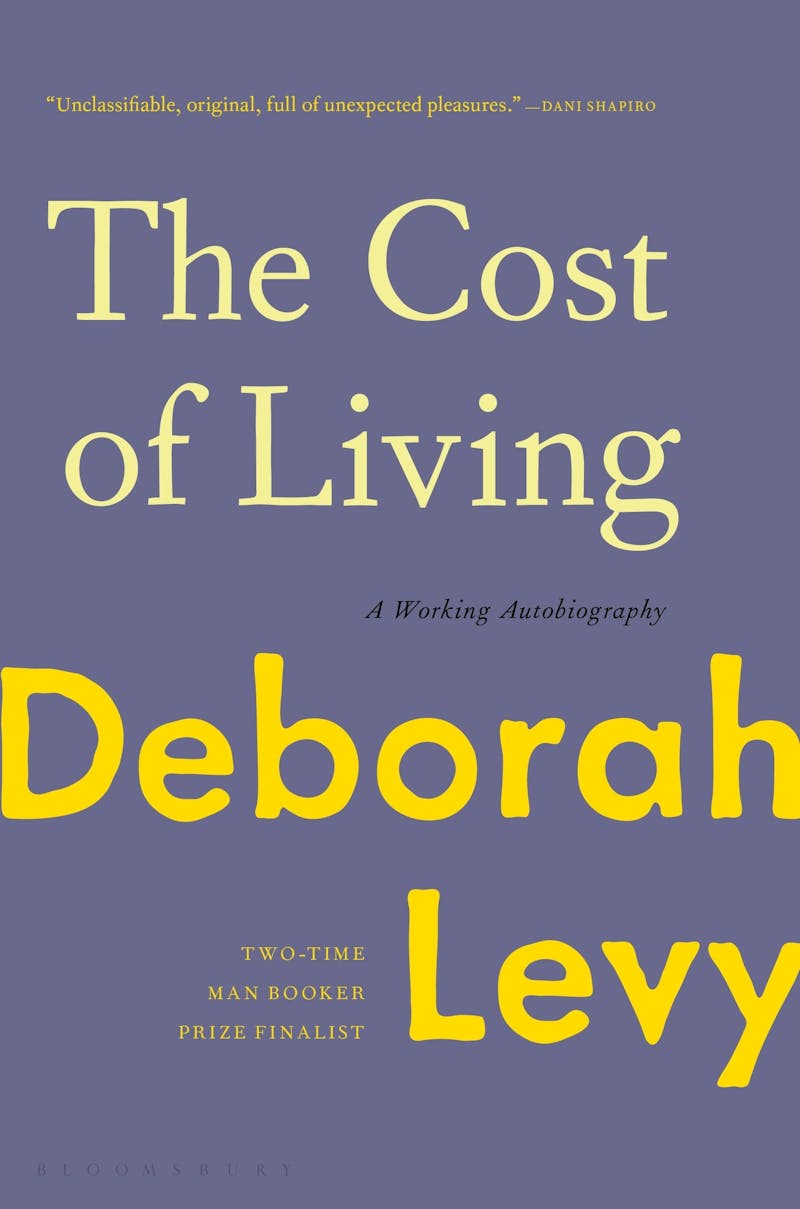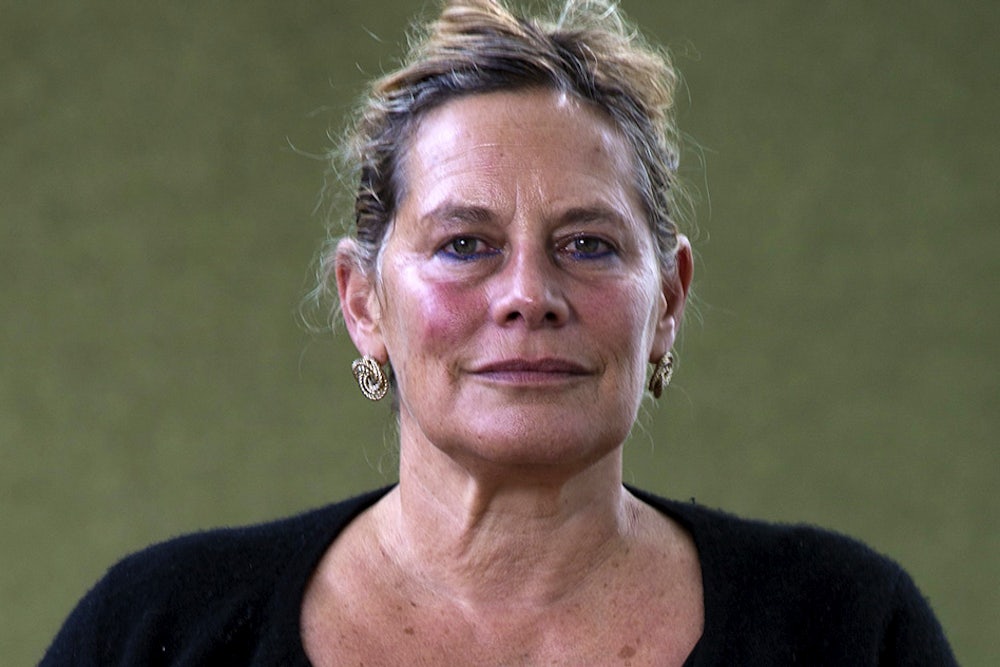Deborah Levy’s new memoir The Cost of Living opens with an epigraph by Marguerite Duras: “You’re always more unreal to yourself than other people are.” Yet when Levy, at 50, decides to separate from her husband after 20 years of marriage, she suddenly begins to feel more real than before. Her life speeds up and becomes chaotic. Dismantling “The Family Home” she shared with her husband and two daughters has made her confront what she termed in the title of her first memoir Things I Don’t Want to Know—who she is, and how she and the other mothers on the playground had “metamorphosed” into “shadows of our former selves, chased by the women we used to be before we had children.” She finds she is able to work surprisingly well in this chaos. The ideal of enduring love in marriage, she decides, may have been a “phantom” all along.

With her heterosexual, nuclear family, Levy had built her life around “the story the old patriarchy has designed.” The Cost of Living chronicles her attempt to redraft that story. The author of six novels—including two nominated for the Man Booker Prize, as well as plays produced by the Royal Shakespeare Company and the BBC—poems, stories, and a libretto, Levy characterizes her life as a long process of learning to use her voice. In Things I Don’t Want to Know, she relates her childhood in South Africa, focusing on the year she was “practically mute” after her father was imprisoned for opposing apartheid, and her adolescence in England, where she scribbled on napkins in greasy spoons to mimic what she thought writers did. That book also foreshadows her unraveling as an adult: Unable to stop herself from crying on escalators, she realizes something has to change when she misreads a poster on “The Skeletal System” as “The Societal System.”
Like the recently liberated Levy herself—who appears in The Cost of Living covered in grease, biking up a treacherous hill on her new electric bicycle, writing in a shed owned by an octogenarian friend, and performing minor feats of plumbing while wearing a black silk nightdress and thick utilitarian postman’s jacket—many of the scenes and observations in The Cost of Living do a lot of work, mostly on behalf of feminist arguments. Early on, Levy describes a man whose husband has died as crying “like a woman”: “He did not so much cry as wail, sob and weep; his tears were very strong…It was a very expressed grief.” This is how she cried when she realized her marriage was over, but she’s never seen a woman cry like a man. She sees signs everywhere, all pointing to The Societal System.
Levy’s project can be read as a kind of foil to Rachel Cusk’s Outline trilogy, which also takes the woman writer as its subject. Whereas Cusk subtracts her narrator, Levy adds more and more of hers, but both are concerned with devising new ways for women to work around the structures imposed on them, as narrators, writers, and people in the world. For female writers, the first person can be difficult—if you don’t wield it like a weapon it could hurt you. Speaking to a woman named Gupta about her malfunctioning Microsoft Word program, Levy notices the I in a chat box “blinking and jumping and trembling.” She feels like that, too. Later she describes a young woman on a train as having “very expressed hair,” blue braids secured with rosebud bands. This statement seems to act as a sort of compensation for the girl’s inability to use her voice: On the train, an older man takes up all the space on the group’s shared table and blathers on about his concerns about refugees, preventing the young woman from studying French on her laptop.
Levy keeps meeting stereotypical sexists like this, men who ignore or talk over young women, and who won’t refer to their wives by their names. As retribution, the only men she names in the book are dead writers—like James Baldwin, Proust, and Nelson Algren, who wanted his lover Simone de Beauvoir to leave Paris and move to Chicago to be with him, in a house, perhaps with a child. De Beauvoir, who like Levy in her French slip and postman’s jacket wanted “everything from life…to be a woman and to be a man,” refused. She doubted she could write at the same time as settling into domesticity. Levy adds: “I had found it quite tricky myself.”
Life without love is a “risk-free life,” and a “waste of time,” but within our societal system, to be a woman who cares about her work in a relationship with a man is difficult, if not impossible: “Women are not supposed to eclipse men in a world in which success and power are marked out for them.” Assuming the role of wife, or even girlfriend, means accepting the stability of the existing structure and sacrificing one’s essentially “chaotic” desires. That’s an especially big risk for a writer—you could lose yourself, and your voice.
It’s taken Levy much longer than de Beauvoir to realize that under patriarchy, as the refrain goes, women can’t have it all. (To be fair to Levy, de Beauvoir also had the advantage of falling in love with one of the few men in the world who would go for the radical non-monogamous intellectual commitment she wanted, especially in the 1950s.) She starts to conceive of herself as a kind of mentor for the younger generation. “The right reader” for her story, she discloses at the beginning of the book, is a young woman she overhears having a frustrating conversation with a dismissive older man. She also brings a writing student to tears by telling her she is talented; the student has made edits that allow her to “own up to” the “force” of her voice. “It is so hard to claim our desires,” Levy reflects, “and so much more relaxing to mock them.”
This wisdom, however, could cut two ways. Levy, with her critique of domestic femininity “as written by men and performed by women,” has one set of desires. But what about the many women who desire to be beautiful, so much that they spend thousands of dollars on clothes and skincare products they cannot really afford? What about those who want nothing more than to get married and have children and cook dinner in a nice big house they’ve decorated? Sometimes our desires are absurd, the most intense ones inspired by the systems we actively try to resist and overthrow. The script is repetitive and tired, circling back on itself. What can we do but laugh about that?
Lines like the one I’ve quoted above are not entirely representative of Levy’s style—she’s a master of puns and pithy, surprising twists, often deployed at her own expense, though she finds it difficult to let funny accidents or coincidences be merely what they are. At one point she ill-advisedly rides her beloved e-bike up a hill in the pouring rain and her bag splits open, sending the chicken she’s just bought to cook for dinner into traffic; a car runs it over. Most people would consider this a hopeless situation and not cook the chicken. Levy turns it into a moment for reflection on the ironies of life as a “free” woman: She is “Free to pay the immense service charges for an apartment that had very little service…Free to support my family by writing on a computer that was about to die.” Then she cooks the chicken—leaving out her recently purchased rosemary, “the herb for remembrance,” which she’d planted in the family garden long ago; all she wants to do is forget—and has a small dinner party with her daughter and her teenage friends. “I thought they could save the world. Everything else fell away, like the flesh from the run-over chicken, which…[we] devoured with relish.”
She’s taking what she’s got and going with it, as in her writing, which riffs on seemingly random images and ideas, creating connections that make these short books feel holistic and sweeping. She uses motifs, such as roses and footsteps, like landmarks on a map, which are useful signposts in her frequently disorienting story. She takes one chapter title, “X is where I am,” from a postcard her mother sent her from South Africa, and writes, “I lost all sense of geographical direction for a few weeks after my mother’s death…Her body was my first landmearc,” the Old English word she thinks of while her clueless taxi driver is trying to get her where she needs to go. Using his GPS, totally lacking a sense of the city beyond the digital map that tells him what to do, he is “absent to its physical presence, and instead was existentially alone but together with his satnav.” Which is also what her marriage was like.
It’s a testament to Levy’s light touch and originality elsewhere that her feminist epiphanies and extended metaphors—life is a tempest, a book or film in which she is trying to conceive of herself as a major character, and a journey—don’t immediately register as cliché. With the help of a quote from Elena Ferrante, she determines that “The process of restoration, the bringing back and repairing of something that existed before”—here she’s talking about her run-down art deco apartment building—“was the wrong metaphor for this time in my life. I did not wish to restore the past.” She paints her walls yellow and finds it disturbing, enacting implied and explicit references to Charlotte Perkins Gilman’s “The Yellow Wallpaper.” She eventually paints all the walls except one white again. Aphorisms that would usually be heavy-handed (“If we cannot at least imagine we are free, we are living a life that is wrong for us”) also breeze past; only later do you realize you’ve been self-helped.
It’s often as if Levy is trying to become the writers she cites, using them as guides through the “black and bluish darkness,” a phrase she uses as a chapter title and later reveals she’s borrowed from an interview with a Mexican woman who crossed the border into America alone, at night. “When a woman has to find a new way of living and breaks from the societal story that has erased her name, she is expected to be viciously self-hating, crazed with suffering, tearful with remorse,” Levy writes. “These are the jewels reserved for her in the patriarchy’s crown…it is better to walk through the black and bluish darkness than reach for those worthless jewels.” This inspirational pronouncement—that jewels are worthless—demonstrates the limits of Levy’s mode of metaphor-making. According to Levy, the Mexican woman she quotes had seven children and worked as a dishwasher in a Vegas casino. I wonder if she can at least imagine she’s free.
